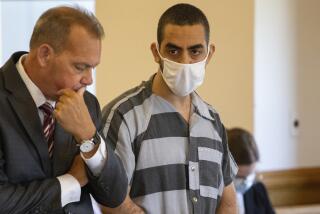Second terror suspect charged
- Share via
MIAMI — The Pentagon on Tuesday charged a 20-year-old Canadian with murder and other war crimes for his alleged role in fighting U.S. forces in Afghanistan, including a 2002 grenade attack that killed a U.S. Army medic.
Omar Khadr was 15 at the time of the clash between invading U.S. forces and Al Qaeda-backed Taliban militants in which Sgt. 1st Class Christopher Speer was fatally wounded, two Afghan militiamen were killed and several U.S. soldiers were injured.
The charges referred to the reconstituted military commissions at Guantanamo Bay, Cuba, accuse Khadr of murder, attempted murder, conspiracy, providing material support for terrorism and spying. They were filed by the commissions’ convening authority, Susan J. Crawford, who serves an attorney general-like role in the process.
Although a murder charge can carry a death penalty, Khadr’s case was defined in the charge sheet as “noncapital,” apparently in view of his age at the time of the alleged offenses.
Khadr is only the second of Guantanamo’s 385 war-on-terrorism prisoners to be charged under the 2006 Military Commissions Act, which Congress passed three months after a U.S. Supreme Court ruling that President Bush overstepped his powers in 2001 when he unilaterally created the tribunals.
The first case to be taken up at Guantanamo under the new process was that of Australian David Hicks, 31, who pleaded guilty last month in exchange for a drastically reduced sentence of nine months, most to be served in his homeland.
Hicks had been held at Guantanamo since January 2002, and his long incarceration became an issue in Australian Prime Minister John Howard’s reelection campaign. The plea bargain nullified a decision by the military commissioners to impose a further seven-year sentence and was seen as a favor to Howard by the Bush administration.
Wounded and baby-faced when captured in July 2002, Khadr was one of 10 Guantanamo prisoners charged under the previous military commissions.
Khadr’s father, Islamic radical Ahmed Saeed Khadr, had taken his son to Al Qaeda camps and safe houses in Afghanistan and Pakistan from the time he was a preschooler. The Egyptian-born elder Khadr, whom Pakistani authorities claim to have killed in a 2003 firefight, held a senior financial position with Al Qaeda and took his sons on visits to Osama bin Laden.
Attorneys who represented the Toronto-born Khadr in the first, truncated prosecution had argued that he was a victim of child abuse rather than a self-determined jihadist.
One of Khadr’s civilian lawyers, American University law professor Muneer Ahmad, said the government was proceeding against his client “in an attempt to rehabilitate the military commissions, which Hicks’ plea demonstrated is a tainted process.”
Ahmad noted that Crawford had removed several references to Khadr’s father from the charge sheet, which Ahmad saw as an attempt to prevent potential jurors from learning of Khadr’s early exposure to radical Islam.
“What they are trying to do is punish Omar for the perceived sins of the father,” Ahmad said.
Khadr must be arraigned within 30 days, and his trial must begin within four months.
The chief prosecutor for the commissions, Air Force Col. Morris Davis, has said he expects to bring charges against about 75 Guantanamo detainees. The rest are being held as so-called enemy combatants to prevent them from imperiling U.S. citizens or their allies during the global war on terrorism, according to Pentagon officials.
*
More to Read
Sign up for Essential California
The most important California stories and recommendations in your inbox every morning.
You may occasionally receive promotional content from the Los Angeles Times.













